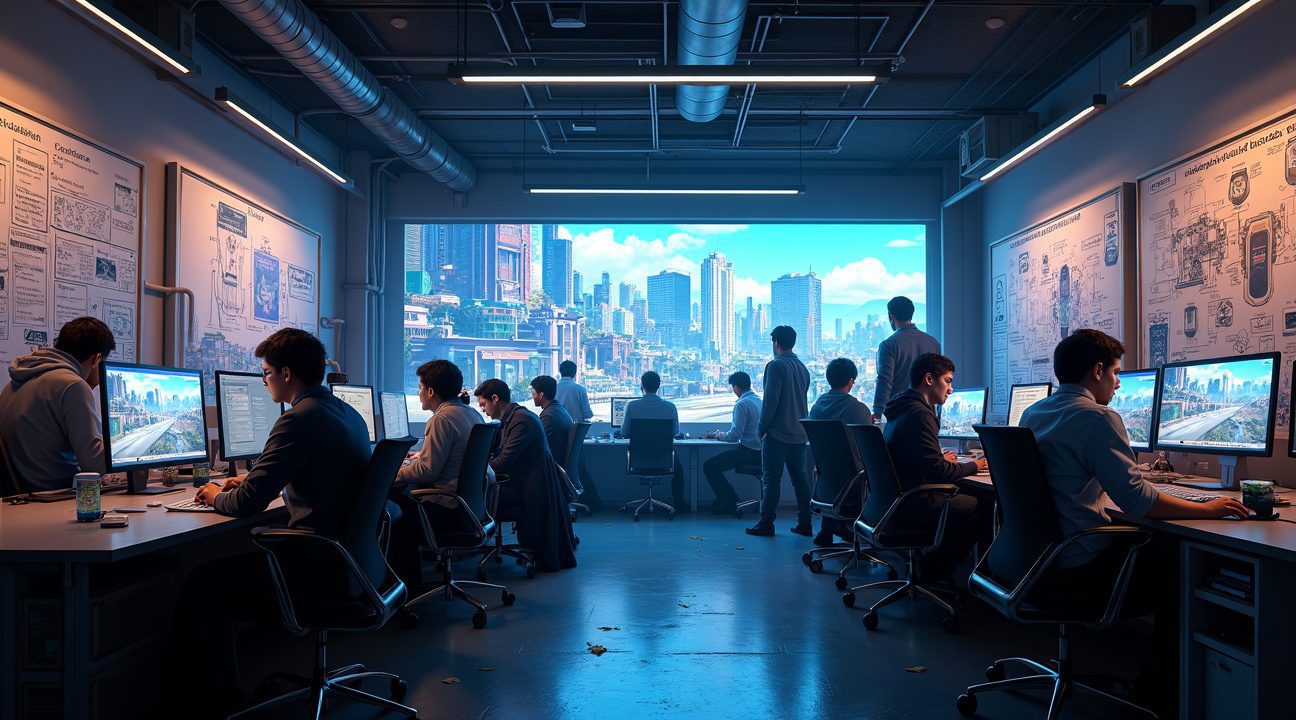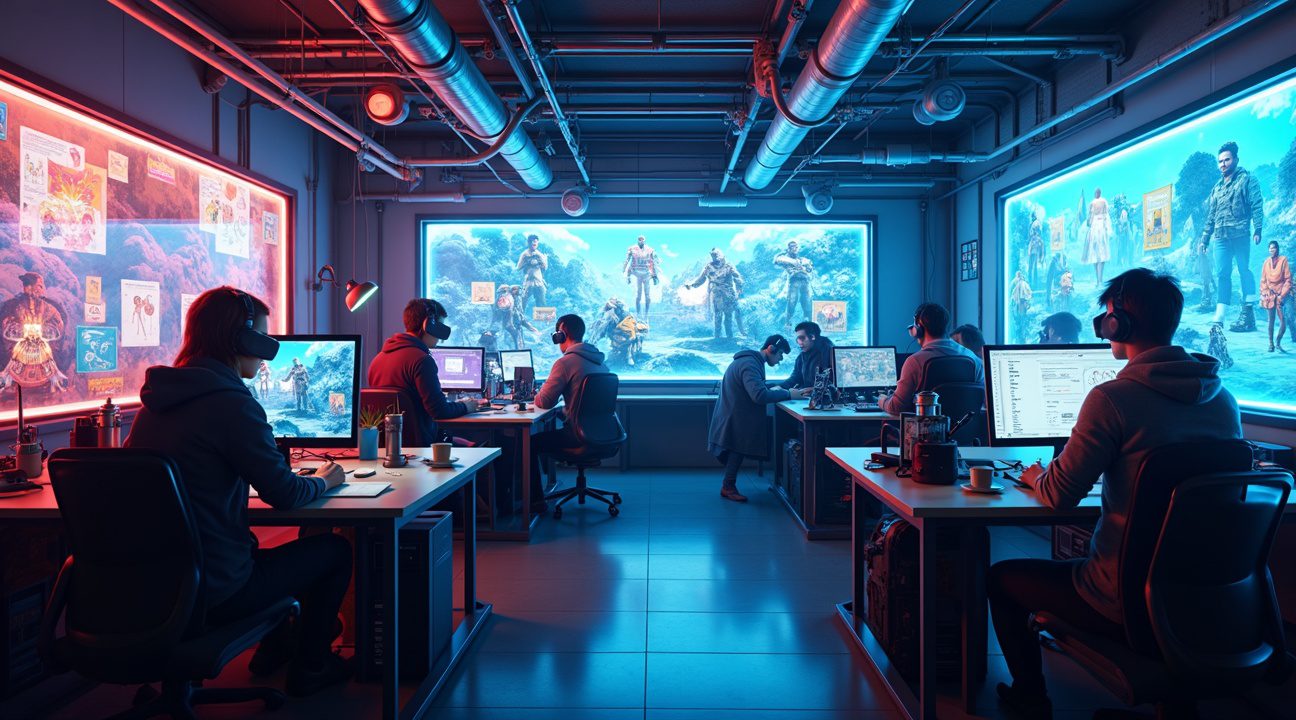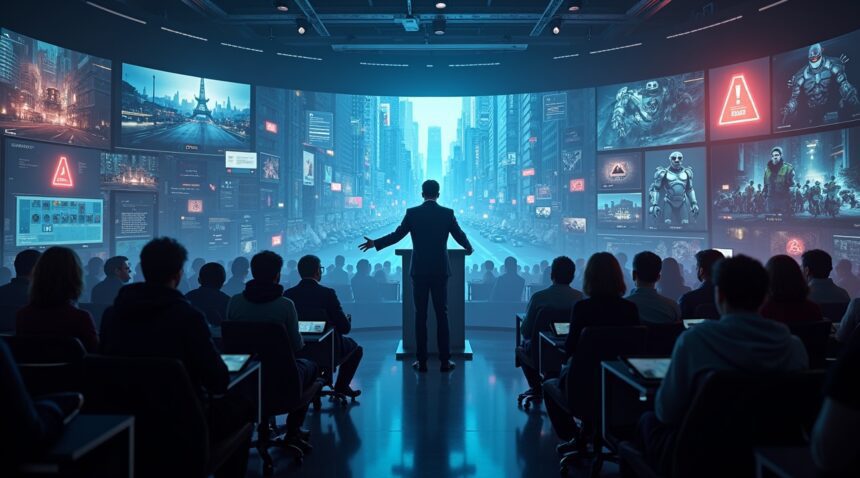Take-Two Interactive CEO Strauss Zelnick has taken a firm stance against the notion that artificial intelligence could independently develop high-quality AAA games, like the next installment of Grand Theft Auto.
AI’s Creative Limitations According to Zelnick
Strauss Zelnick highlights a fundamental issue with current AI technology: it lacks the ability to create genuinely original content. In his view, AI merely operates by recognizing patterns and reassembling known concepts. As a result, tools reliant on AI fall short in delivering the kind of groundbreaking creativity required to develop a title on the scale of Grand Theft Auto.
Preserving Human Imagination
Instead of relying solely on AI for game development, Zelnick notes that Take-Two will focus on using AI to streamline repetitive tasks while protecting the space for human-driven innovation. He believes elements like game design, storytelling, and player immersion must still be led by creative minds rather than algorithms.
Key Takeaways
- AI functions as a pattern-recognition tool that replicates variations of known ideas rather than originating new concepts needed for AAA game design.
- Take-Two will strategically apply AI to automate routine development tasks, safeguarding creative elements for human designers and writers.
- Legal risks remain unresolved for AI-generated content, as copyright protections for AI-created work are still vague and could expose studios to infringement claims.
- GTA 6’s production involves massive human investment and a significant financial commitment, illustrating the company’s reliance on traditional development over AI shortcuts.
- Industry perspectives on AI integration vary, with Take-Two and Microsoft showing caution, while Electronic Arts adopts a more aggressive AI implementation strategy.
Industry-Wide Implications
The debate sparked by Zelnick’s comments highlights the broader uncertainties surrounding AI’s role in the future of game development. While AI tools may improve efficiency or reduce costs, the generation of iconic, genre-defining titles appears to remain firmly in the hands of human experts — at least for now.
CEO Declares AI Fundamentally Lacks Creative Power to Build AAA Games
Take-Two Interactive CEO Strauss Zelnick delivered a definitive stance on artificial intelligence’s role in game development during the CNBC Technology Executive Council Summit. His position challenges the growing narrative that AI will revolutionize gaming production across the industry.
Zelnick’s assessment cuts straight to the core of what separates human creativity from machine processing. “Could we push a button tomorrow and create an equivalent to the Grand Theft Auto marketing plan? The answer is no,” he stated during the summit. This declaration directly addresses speculation about AI’s potential to streamline or replace traditional development processes for major gaming franchises.
The CEO’s critique centers on AI’s inherent limitation as a pattern-recognition system. He explained that artificial intelligence operates through data analysis, meaning it can only reproduce variations of existing content rather than generate genuinely original concepts. This fundamental constraint becomes particularly problematic when developing AAA franchises that demand breakthrough innovation and creative risk-taking.
Human Innovation Drives Gaming Excellence
Zelnick emphasized that the exceptional quality found in Take-Two’s premier franchises stems from extraordinary human creativity. He specifically highlighted the development teams at Rockstar Games as examples of the irreplaceable human element in game creation. The CEO’s comments point to the complex creative processes behind titles like Grand Theft Auto, Red Dead Redemption, and NBA 2K as evidence of capabilities that extend far beyond current AI limitations.
The timing of these statements proves particularly significant given the gaming industry’s current fascination with AI integration. While many companies explore AI for:
- Asset generation
- Dialogue writing
- Procedural content creation
Zelnick’s position suggests that the next GTA will continue relying on traditional human-driven development approaches.
Zelnick’s assessment aligns with practical observations about AI-generated content across various media. Current AI systems excel at producing technically competent but often formulaic results. They struggle with the nuanced storytelling, cultural commentary, and innovative gameplay mechanics that define industry-leading titles. The CEO’s position reflects an understanding that derivative content cannot match the groundbreaking experiences that drive massive commercial success.
The implications extend beyond simple content creation to encompass the strategic vision required for major gaming projects. Developing a Grand Theft Auto title involves complex decisions about:
- Narrative direction
- Social commentary
- Technological innovation
- Market positioning
These multifaceted considerations require the kind of contextual understanding and creative intuition that current AI systems cannot replicate.
Zelnick’s comments also address the broader question of AI’s role in creative industries. His perspective suggests that while AI might serve as a useful tool for specific tasks, it cannot replace the fundamental human creativity that drives truly innovative entertainment experiences. This stance positions Take-Two as maintaining traditional development approaches while the industry grapples with AI integration strategies.
The CEO’s declaration comes as GTA 6 expectations reach unprecedented levels. His confidence in human-driven development processes reflects Take-Two’s commitment to maintaining the creative standards that have made their franchises industry leaders. The statement essentially promises that future Grand Theft Auto titles will continue prioritizing human innovation over technological shortcuts.
This position distinguishes Take-Two from competitors who have embraced AI more enthusiastically for content generation and development assistance. Zelnick’s stance suggests that the company views its human talent as an irreplaceable competitive advantage in creating the kind of culturally significant gaming experiences that define entire generations of players.
Gaming Industry Split on AI Integration for Development
The gaming industry faces a significant crossroads regarding artificial intelligence integration, with major publishers and platform holders taking dramatically different approaches. This divide reflects fundamental disagreements about AI’s role in creative processes and its potential impact on game quality.
Contrasting Executive Perspectives
Take-Two CEO Strauss Zelnick maintains a conservative stance, emphasizing that AI should supplement rather than drive creative development. His approach centers on using artificial intelligence for mundane, repetitive tasks while preserving human creativity for core game design. This philosophy directly influences major franchises, including the highly anticipated GTA 6 development.
Microsoft Gaming’s Phil Spencer shares similar reservations about AI in creative development, though he endorses its use for security applications within gaming platforms. Spencer’s position highlights how even AI-supportive companies draw clear lines between operational and creative applications.
Electronic Arts represents the opposite end of the spectrum, embracing broader AI integration across various development processes. Their open approach contrasts sharply with Take-Two’s cautious methodology, creating an interesting industry dynamic where different publishers explore varying levels of AI adoption.
Global Adoption Patterns and Strategic Implementation
Japanese game publishers demonstrate another perspective entirely, with over half reportedly incorporating AI tools in some capacity. This widespread adoption in Japan suggests cultural and market differences may influence how companies approach artificial intelligence integration.
Take-Two’s current strategy focuses specifically on automation of tedious development tasks. The company identifies AI’s strength in handling repetitive work that traditionally consumes significant developer time and resources. By automating these processes, human developers can concentrate on creative problem-solving, narrative development, and innovative gameplay mechanics.
Zelnick’s position emphasizes that successful game franchises require human ingenuity that artificial intelligence cannot replicate. He argues that while AI excels at pattern recognition and data processing, it lacks the intuitive understanding of player psychology and emotional engagement that drives memorable gaming experiences.
The debate extends beyond philosophical differences to practical considerations. Companies must balance development efficiency with creative integrity while considering player expectations and market demands. High-stakes projects like major franchise releases amplify these concerns, as publishers cannot afford to compromise quality for technological novelty.
Industry observers note that AI integration varies significantly based on game genres and development scales. While AI might effectively handle certain technical aspects of game creation, creative elements like storytelling, character development, and unique gameplay mechanics still require human oversight and innovation.
The ongoing discussion reflects broader questions about technology’s role in creative industries. Publishers must navigate between embracing technological advances and maintaining the human elements that make games compelling. This balance becomes particularly crucial for established franchises where fan expectations run high and creative missteps can have significant financial consequences.
Different approaches to AI integration also reflect varying company philosophies about risk management and innovation. Conservative publishers prefer gradual implementation with proven benefits, while more aggressive adopters experiment with cutting-edge applications despite potential uncertainties.
The industry’s current trajectory suggests that AI will continue playing an increasingly important role in game development, but the extent and nature of that integration remains hotly debated. Companies like Take-Two demonstrate that successful AI adoption doesn’t require wholesale embrace of the technology but rather strategic implementation that enhances rather than replaces human creativity.
Copyright and Legal Minefield Surrounding AI-Generated Content
Take-Two faces significant legal hurdles that make widespread AI adoption a risky proposition for game development. CEO Strauss Zelnick has highlighted how current copyright laws create a protection gap for AI-generated content, leaving companies vulnerable to intellectual property disputes. This uncertainty means that any content created through AI tools might not receive the same legal protections as traditional creative works.
The situation becomes even more complex when considering how AI models acquire their capabilities. Most generative AI systems train on vast datasets that include copyrighted materials, creating potential liability issues for companies that use these tools. I’ve observed how this training process essentially means AI systems learn from existing creative works without explicit permission from original creators, opening doors to infringement claims.
Multiple Legal Risks Create Operational Challenges
Take-Two’s cautious approach reflects several interconnected legal concerns that could impact major game releases. The company must consider these key risk factors:
- Ownership disputes over AI-generated assets that lack clear copyright protection
- Potential infringement claims from creators whose work was used in AI training data
- Uncertainty about fair use applications in commercial AI-generated content
- Liability exposure if AI tools inadvertently reproduce recognizable copyrighted elements
These legal ambiguities become particularly problematic for a company developing high-profile franchises like Grand Theft Auto. Given the massive commercial success of previous GTA titles, with GTA sales records demonstrating the franchise’s value, Take-Two can’t afford legal challenges that might delay or complicate major releases.
The company’s wariness extends beyond simple copyright concerns to fundamental questions about content ownership. If an AI system generates character designs, dialogue, or environmental assets, determining who holds rights to those creations remains legally murky. This uncertainty could lead to costly litigation, especially if competitors or independent creators claim their copyrighted works influenced AI-generated content.
Zelnick’s position reflects industry-wide concerns about rushing into AI adoption without proper legal frameworks. Take-Two recognizes that while AI might offer creative possibilities, the current legal landscape makes it too risky for large-scale implementation in major game development projects. Until lawmakers and courts establish clearer guidelines around AI-generated content ownership and training data usage, companies like Take-Two will likely maintain their cautious stance on generative AI integration.
GTA 6 Development Represents Massive Human Investment and Innovation
The upcoming GTA 6 release showcases exactly why artificial intelligence can’t replace human creativity in major game development. Take-Two CEO Strauss Zelnick’s description of the game’s budget as “staggering” reflects the enormous human resources dedicated to crafting this experience. Scheduled for May 2026 on Xbox Series X|S and PlayStation 5, the project represents years of coordinated effort from talented teams across multiple disciplines.
Rockstar Games has assembled these large collaborative groups to handle the intricate details that make Grand Theft Auto titles legendary.
- Writers develop complex storylines with branching narratives and memorable characters.
- Artists create immersive environments that feel lived-in and authentic.
- Programmers solve technical challenges that push gaming hardware to its limits.
- Sound designers craft audio landscapes that enhance every moment of gameplay.
The Creative Process Behind AAA Excellence
Game development at this scale requires constant innovation and problem-solving that goes far beyond what current AI can accomplish. Teams spend months refining gameplay mechanics, testing different approaches, and iterating on ideas until they achieve the desired experience. The leaked gameplay footage already demonstrates the attention to detail that human developers bring to every aspect of the game.
World-building in particular demands human intuition and cultural understanding. Developers must create environments that feel authentic while also serving gameplay purposes. They consider:
- How different areas connect
- How players will move through spaces
- How each location contributes to the overall narrative experience
Legacy of Human-Driven Success
Rockstar’s track record speaks to the value of human creativity in game development. The company has consistently produced influential titles that shape the gaming industry. GTA V’s sales dominance demonstrates how human-crafted experiences resonate with players across generations.
Despite facing some development delays, Rockstar’s history suggests GTA 6 will maintain the studio’s high standards. The anticipation surrounding the game reflects confidence in the team’s ability to deliver another groundbreaking experience. Industry experts and fans continue monitoring the development closely, expecting another milestone that showcases what human creativity can achieve in interactive entertainment.

Human Creativity Still Drives Entertainment Industry Success
Strauss Zelnick’s recent statements highlight a fundamental truth about entertainment production that many industry leaders continue to champion. The Take-Two CEO firmly believes that artificial intelligence cannot replicate the creative excellence found in major franchises like Grand Theft Auto, NBA 2K, Red Dead Redemption, and Borderlands. His perspective stems from years of witnessing how human-driven development teams consistently deliver groundbreaking experiences that resonate with millions of players worldwide.
Zelnick’s approach to game development centers on providing creative teams with the resources they need to flourish without artificial constraints. He advocates for environments where developers can work without significant budgetary or time limits, allowing originality to take precedence over rushed production schedules. This philosophy has proven successful across Take-Two’s portfolio, where studios like Rockstar Games have established themselves as industry leaders through their commitment to innovative storytelling and game design.
The Creative Process That AI Cannot Replicate
According to Zelnick, Rockstar Games consistently delivers exceptional creativity that transcends what current AI technology can achieve. The studio’s track record speaks volumes about this approach, with GTA sales breaking records and maintaining cultural relevance years after release. The intricate world-building, character development, and satirical commentary found in these games require a level of human insight and cultural understanding that remains beyond AI’s current capabilities.
The debate over AI’s role in game development continues to evolve as technology advances. However, Zelnick’s comments reflect a broader industry sentiment that human talent remains the cornerstone of meaningful storytelling and innovation in video games. While AI can assist with certain technical aspects of development, the creative vision, emotional depth, and cultural commentary that define successful games still require human authors.
Players eagerly anticipating future releases, including the upcoming GTA 6 trailer, can expect the same level of human-driven creativity that has made these franchises legendary. Zelnick’s stance reinforces that despite technological advances, the entertainment industry’s most successful projects continue to emerge from human imagination, experience, and creative intuition that cannot yet be artificially reproduced.
Future of Gaming Technology Without AI Dependence
Take-Two’s vision for the gaming industry centers on human creativity and innovation rather than surrendering creative control to artificial intelligence systems. I believe this approach represents a fundamental shift in how major gaming companies view technology’s role in entertainment development.
The company’s leadership recognizes that revolutionary gaming experiences emerge from the minds of talented developers, not from generative AI tools like OpenAI’s ChatGPT or Sora. This philosophy directly challenges the current industry trend of embracing AI as a development shortcut. Instead, Take-Two commits to investing in human talent and traditional development methodologies that have consistently delivered exceptional gaming experiences.
Strategic Focus on Human-Led Innovation
Take-Two’s strategy emphasizes next-generation immersive technologies that enhance rather than replace human creativity. The company continues developing cutting-edge gaming experiences through skilled developers who understand narrative depth, character development, and player engagement on levels that current AI cannot match. This approach has proven successful with franchises that maintain both critical acclaim and commercial viability.
The gaming giant’s commitment to human-driven development becomes particularly relevant as anticipation builds for upcoming releases. Industry observers note that GTA 6 trailers generate massive excitement precisely because players trust the human creativity behind these productions. Previous successes demonstrate how human-led development creates lasting gaming experiences that resonate with audiences worldwide.
Preserving Creative Integrity in Gaming
Take-Two’s stance reflects broader concerns about maintaining authenticity in entertainment. The company understands that gaming franchises built on human creativity develop deeper emotional connections with players. This philosophy becomes especially important considering how GTA sales records demonstrate the lasting appeal of carefully crafted gaming experiences.
Rather than viewing AI as competition, Take-Two positions human creativity as irreplaceable in developing meaningful entertainment. The company’s approach suggests that technological advancement doesn’t require abandoning traditional development methods that have consistently produced groundbreaking results. This perspective offers a compelling case study for how gaming companies can innovate while preserving the essential human elements that make entertainment truly engaging and memorable.

Sources:
HotHardware – Take-Two CEO Proclaims That AI Can’t Make Games Like Grand Theft Auto
TechBuzz AI – Take-Two CEO: AI Can’t Create Next Grand Theft Auto Game
RockstarINTEL – GTA 6 CEO Says AI Won’t Make GTA 7
NDTV Profit – Don’t Expect AI To Invent the Next ‘Grand Theft Auto’, Says Take-Two CEO Strauss Zelnick
VideoGamesChronicle – Take-Two’s CEO doesn’t think a Grand Theft Auto built with AI would be very good
CBR – Take-Two CEO Says AI Can’t Make the Next GTA: ‘No Creativity’
Pure Xbox – Take-Two Boss Says GTA Couldn’t Be Made With AI Because ‘There’s No Creativity In That Model’
TheGamer – Grand Theft Auto Will Never Be Matched By AI Games, Take-Two CEO Strauss Zelnick
GameSpot – Take-Two CEO Doesn’t Believe AI Can Compete With Grand Theft Auto
YouTube – GTA 6: 5 Wild AI Theories That Might Be Real
GamesRadar – Take-Two CEO calls generative AI “the future of technology” that will increase employment months after saying GTA 6’s creative genius is human
GAMINGbible – Rockstar issues GTA 7 Update and it’s Good News
Gadgets 360 – Take-Two CEO Says AI Won’t Be ‘Very Good’ at Making a Game Like Grand Theft Auto

